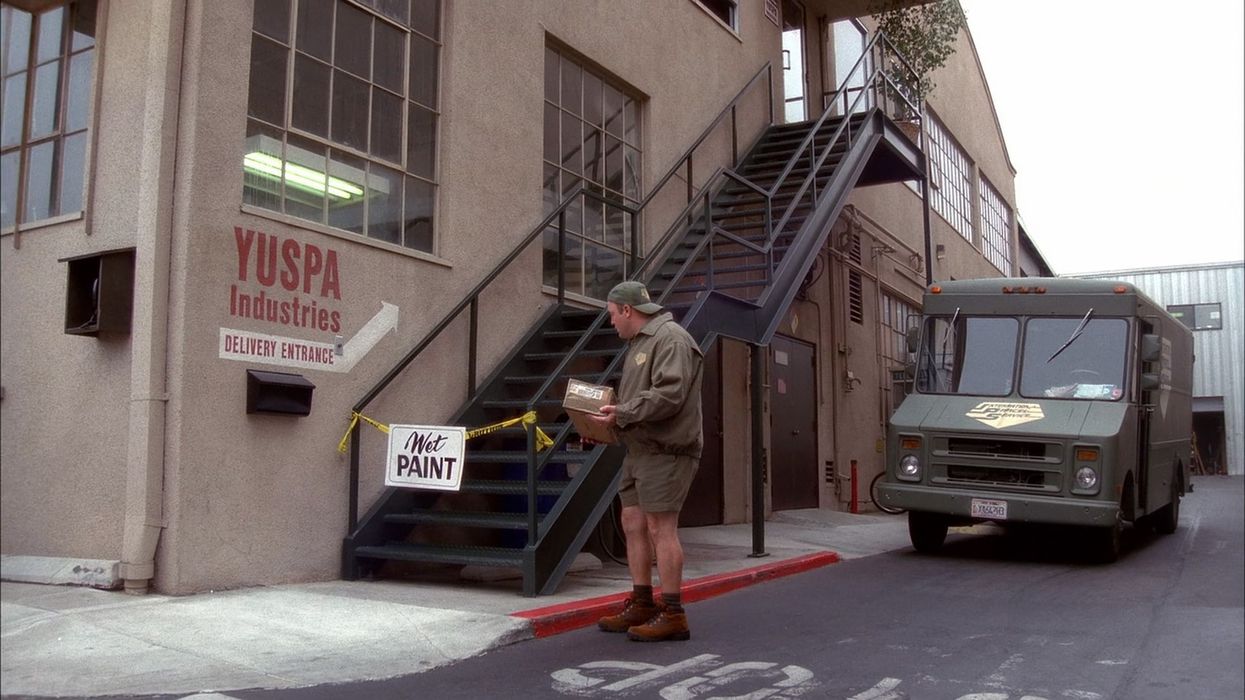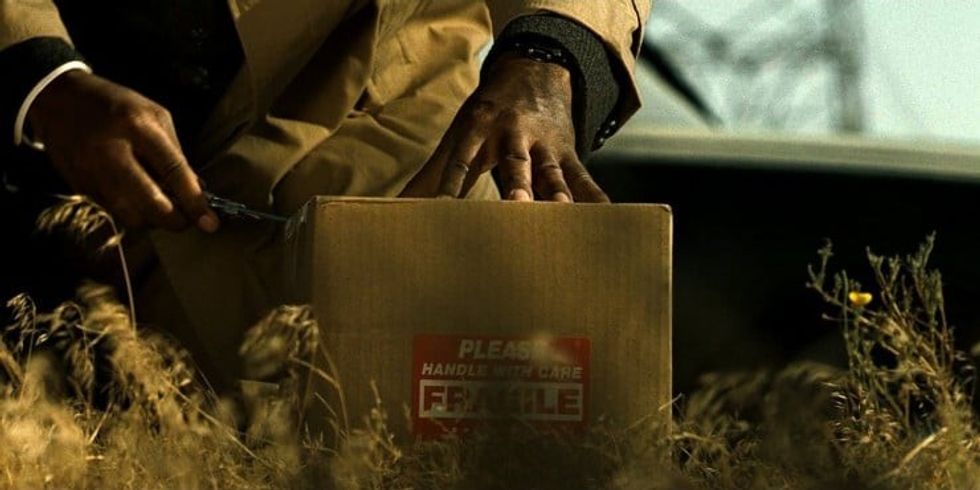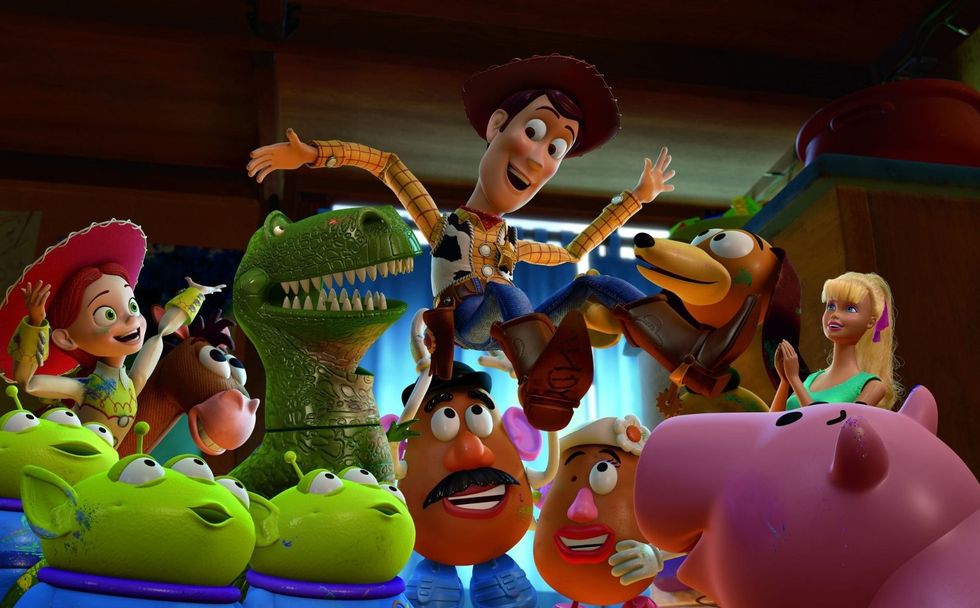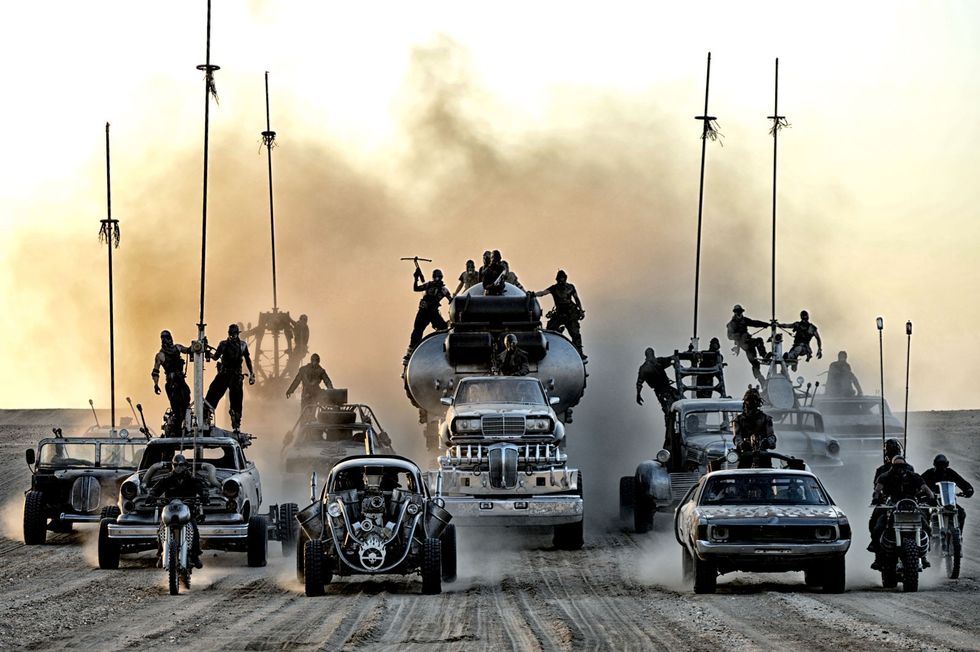A Love Letter to Cinema: The Challenges of Making an Indie Film in China
For 'King of Peking,' with a lot of luck and the help of around 600 friends, director Sam Voutas shot a love letter to cinema and Chinese bootlegging.
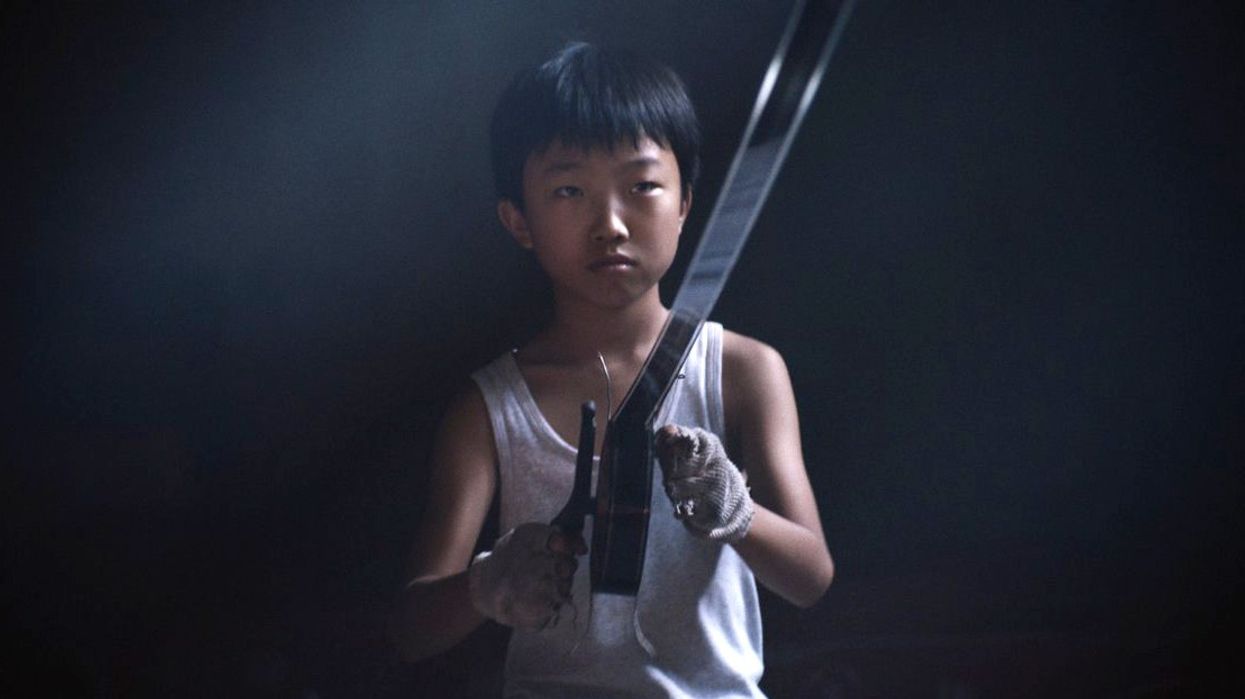
Ever dream of dropping out of grade school and running a pop-up cinema with your father? How about a bootleg DVD business? In King of Peking, that's exactly what the two protagonists do. Big Wong and Little Wong are obsessed with cinema; they know all the classics, and their greatest love is sharing them with the rest of Beijing—for a profit. They're sidekicks, partners in hustle. But when reality starts to impede on the duo's fun, Big Wong must do anything he can to keep the movie magic alive.
King of Peking sparkles with a true love of its medium; every moment is an opportunity to remind the audience why these people fell in love with cinema. The Wongs are constantly quizzing each other on movie scores, reenacting scenes, or dropping references mid-conversation. They handle film reels as second nature and seem to live by the motto, "At least we'll always have the movies." And when watching King of Peking, it's hard to feel differently.
"I view filmmaking like going to war: you want to work with the people that you trust your life with."
Director Sam Voutas is an Australian filmmaker who grew up in China in the '80s and '90s, and his film is riddled with a nostalgia for that time. Voutas' first feature, Red Light Revolution, China's "first sex shop comedy," features many of the same actors and crew as King of Peking. The team raised most of the money for the film on crowdfunding platforms in the U.S. and China.
No Film School got a chance to speak with Voutas after the film's Tribeca Film Festival premiere. He discussed his choice to return to the same crew, the process of Kickstarting the film, and his undying love of cinema.
No Film School: Why did you choose to stick with the same crew as your previous film, Red Light Revolution?
Sam Voutas: I view filmmaking like going to war: you basically want to work with the people that you trust the most, that you trust your life with. When you're on a film set, the pressure is so high, you need your best friends with you. And so when we made Red Light Revolution five years ago, I was really doing it with my friends, and I wanted to do that again. It's more important to me to work with someone that you trust and know than, say, a stranger with a better resume.
NFS: Have there been any struggles making an indie U.S./China co-production with The Great Firewall in place?
Voutas: The Great Firewall was primarily a challenge early on when we were doing our crowdfunding campaign, and not so much after. We'd chosen Kickstarter as our crowdfunding platform but discovered that it was periodically blocked in China; plus, most of our backers in China couldn't speak English. So to get over the barrier, we did two completely separate crowdfunding campaigns—one in the West on Kickstarter, then one inside China on another platform in Mandarin immediately after. It meant we didn't have to be worried about the site being blocked, and we raised awareness and funds completely separately.
With distribution, we don't anticipate the Great Firewall being an issue, as any platforms we screen on there will be within the country, so fully accessible to anyone.
"It was really interesting shooting a movie about a projectionist who lives in a cinema, and also have a man who was living the same life, there on location, at the same time."
NFS: Did you raise your entire budget through Kickstarter?
Voutas: We raised a portion of the budget via Kickstarter, and we also had some Chinese investment.
NFS: Can you say what the total budget was?
Voutas: I can't, but we can definitely talk about shooting on a lower budget. I think the big change, logistically, between making the last film in China five years ago and then making this film now is the cost of shooting in China has gone up exponentially, as has the cost of living. So one of our challenges was trying to shoot a bigger a movie, which had many more grand locations—it's a period piece—on a budget that wasn't... well, I'd say you'd ideally want several million dollars to shoot a period piece in China.
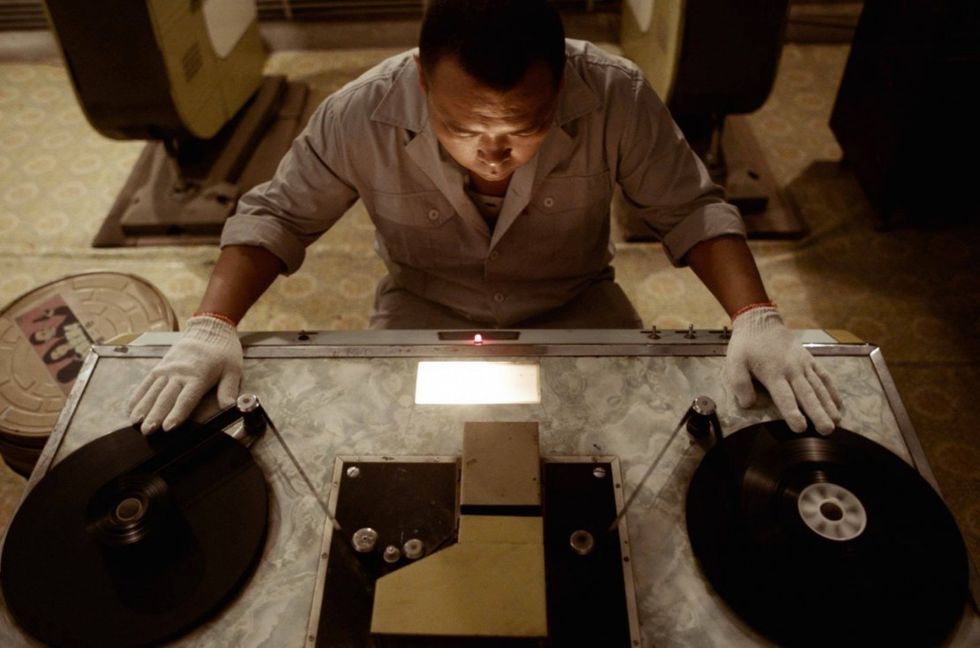
Voutas: The way that we worked around it was just trying to do a lot more early legwork. It was pretty DIY. Basically, I'd get on a train or on my bicycle and go location scouting. Other members of the crew would do the same thing, and we'd just take photographs of the places that we thought were of that period.
NFS: And how did you secure some of these amazing locations?
Voutas: Beijing has transformed so much that we couldn't actually shoot within Beijing-proper. It's too modern. So we had to go to towns in the neighboring two hundred miles and shoot there. In terms of the cinema, which was one of the hardest locations for us to find—and we wouldn't have had a movie without it—a lot of it just came down to luck. We scouted a whole bunch of cinemas that weren't right or just logistically wouldn't be easy to shoot at.
Luckily, one of our crew members in the art department had just stumbled upon [the cinema we used] for another project. That cinema is actually in the countryside, so we could only shoot it from one angle. If we started doing side angles, you'd realize it had fields on either side.
NFS: It really is an incredible space. Was the apartment really below the stage?
Voutas: The apartment that they live in isn't actually in the basement, but it actually is in the cinema. So the art department closed off all of the windows with plaster to create that cavernous feeling. And coincidentally there was actually an old projectionist who was living in the cinema while we were shooting, and he was very similar to our lead character in that he would wash his clothes in the main cinema room and sleep right next to the projection booth. So it was really interesting shooting a movie about a projectionist who lives in a cinema, and also have a man who was living the same life, there on location, at the same time. It was very helpful, actually.
NFS: I imagine he and your lead actor had some great conversations.
Voutas: Yeah, not just conversations, but also the projectionist was able to help teach our actor about how to use a film projector. How to turn it on, and the inner workings, the logic of the machinery, which was so important.
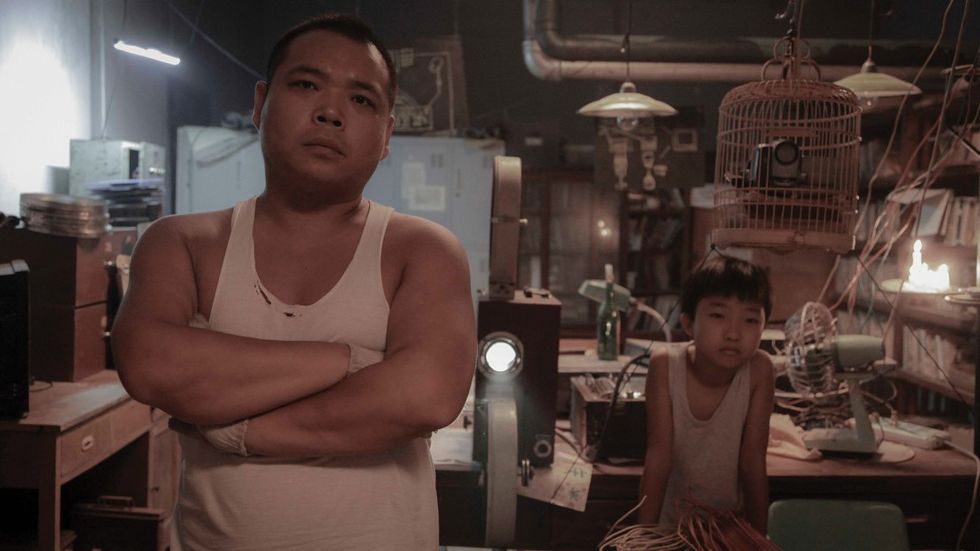
NFS: Everything about the film is so romantic. There's a lot of nostalgia and a lot of references. I'm wondering if you did anything in pre-production, or during production, to get the crew in that mindset.
Voutas: I didn't have to work too hard to get the crew to feel nostalgic because I think a lot of the people who were working on the film were of my age group, in their mid-to-late-30s and remembered China as it was. So we all just naturally had a fondness for a China that is now gone. And we're all cinema buffs. But one thing we did do is find reference movies that evoked the colors and the costume designs.
NFS: The father and son duo dubbing the classic films into Chinese is such a wonderful scene. Where did that come from?
Voutas: Watching old Hollywood movies in Beijing growing up, often the ones on TV or at cinemas would be dubbed into Chinese, and badly. It always took me out of the story because the dubbing was usually both too melodramatic and out of sync. And then, years later when DVDs hit the market, suddenly you had all these menu options on the disc, you could switch languages with the click of a button. So I thought, wouldn't it be fun if Big and Little Wong did the same thing and dubbed their own audio for movies out of their basement studio? What if, in order to boost sales, they played out the parts of the characters in their rooms and recorded their own Chinese language versions?
"Maybe every shoot I do from now on needs a 'silly day.'"
We had the most fun shooting it, as the actors could really play up, for a change. The rest of the movie is more understated in terms of performance, but for those scenes, they could really let their hair down and act big. It felt like having a day off from set. It made me think, maybe every shoot I do from now on needs a "silly day."
NFS: Have you ever bought a bootleg DVD?
Voutas: In China in the 1990s, there was no way to watch movies outside of bootleg DVDs. So the way I look at it is: if you've got a choice, of course you're gonna buy the real thing, but in China, we had no choice. It was the only thing that was available. It was the only thing selling on the street.
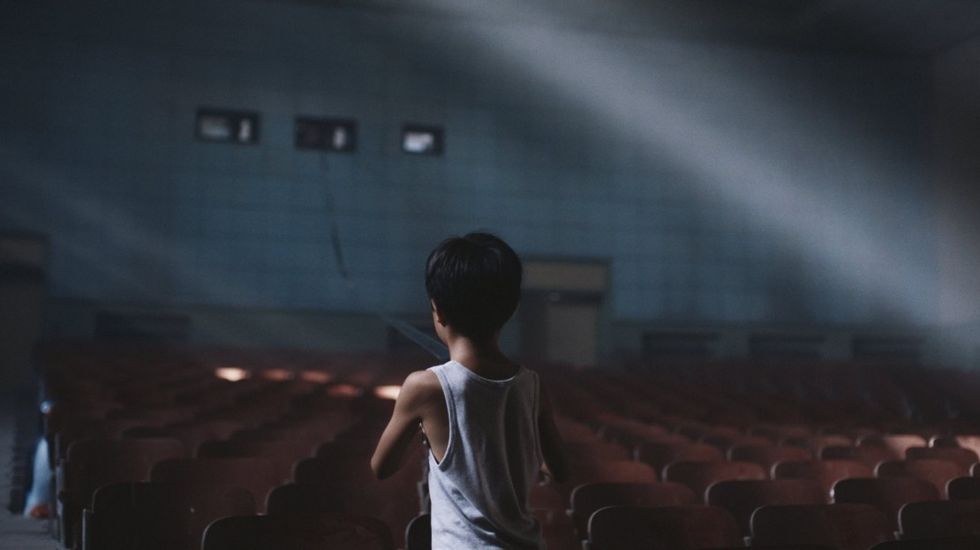
NFS: The way the film is shot is very carefully executed, and it's clear that you as a director and your cinematographer are very well-versed in film language. I think it draws a contrast with the fast-paced DIY world that they're living in. Do you want to talk about your intentions with the way it was shot?
Voutas: So the process that I use on set is at the end of every day after we've wrapped: I will have a meeting with the 1st Assistant Director, and I'll tell him my shot list for the next day. And the 1st A.D. will throw his ideas in as well, and then we'll come up with a list for the next day's shoot. And that next morning, probably an hour before the rest of the crew comes to set, we will go to the location with the D.P. and we'll show him the ideas. A lot of times he'll have his own suggestions; also, a lot of stuff that we thought could happen maybe isn't practical. So it goes through several phases, and by the time we're shooting, we have the shot list for that entire day all set.
Then, we repeat the next day. I don't storyboard earlier or anything; I just do basic storyboards the night before.
NFS: Wow. That's really impressive.
Voutas: [Laughs] Well, it isn't like we winged it because it's gone through so may drafts within a 12-hour period. By the time it's gotten to that list which I've locked, it's had the input from a lot of very talented people.
NFS: Did you shoot it on film?
Voutas: No, we didn't, actually; we shot it on the Alexa. But we spent a lot of time color grading in Beijing, looking at reference photos from the 1990s, trying to evoke that sense of film. Often, we were grading it in a direction that you usually wouldn't go in, to make it feel dirtier.
NFS: You've mentioned in other interviews how the script was inspired by birth of your daughter and your changing perspective on what it means to be a role model. I was just wondering if your directing style had changed since becoming a father.
Voutas: I don't do as long days because I've got the pressure of knowing that I've got to come home at the end of the day, so that's certainly changed. Definitely, in terms of the screenplays that I write—they tend to be a bit more romantic, because having a child now, there's this new love in my life. I can't help but look at the world with romantic glasses. But yeah, certainly as an independent filmmaker, it's made me think a lot more about the challenges of parenting and doing independent films, because it can be very hard to go on location for long periods of time when you're raising a child. I think that's really, really important issue that's not discussed much.
For more, see our complete coverage of the 2017 Tribeca Film Festival.
